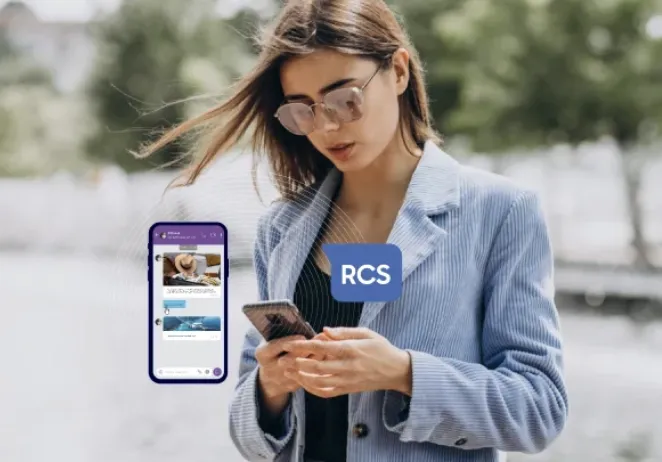Templates, Systems, and Smarter School Messaging
As schools prepare for an exciting new academic year, it’s time school administrators and teachers added bulk SMS messaging templates into their communication plan. SMS for schools is particularly effective in crisis situations, as it can provide parents and teachers with information in mass even when the Internet is down. But SMS is also an effective channel for routine communications between teachers and students, schools and parents, and school staff and their administrators.
Scroll down to see our examples of SMS templates for school and teachers. Feel free to copy and use them!
Bulk SMS allows schools to communicate instantly with hundreds—or even thousands—of people at once. With the right school communications, administrators can ensure that messages are delivered quickly, clearly, and directly to the people who need them most. And using SMS templates cam make communication even faster and more consistent across school campus and beyond.
While email and mobile apps have their place, they can easily be ignored, delayed, or buried under other notifications. SMS, by contrast, is nearly always read within minutes. For schools trying to reach large numbers of parents, students, or staff at once, the speed and visibility of a text message are unmatched.
SMS Templates for Teachers and Students (and their Parents)
The average student is in fourth or fifth grade when they receive their first smartphone. Teachers have the opportunity to instill positive phone usage in their students, by encouraging their pupils to use SMS to keep up with schoolwork.
To that end, teachers can send text messages to their students reminding them of upcoming tests, or alerting them that the book report they had been working on for the last month is finally due.
Triggers using SMS templates can be set up to automatically text students who have missed a few days of school or habitually forget their homework, asking them how they are feeling or reminding them to do their work.
For schools that have an online student portal, two-factor authentication can be used to maintain a student’s online privacy and protection.
With the help of bulk SMS systems and templates for schools, these types of academic reminders can be scheduled in advance, personalized, and sent without extra effort from teachers—freeing up more time for instruction.
Connecting Schools and Parents
Over the course of a school year, administrators and parents require multiple touchpoints. They remind parents to attend school events like teacher conferences, plays, or basketball games. In colder climates, schools could use SMS to let parents know that there will be outdoor recess, and students need to dress warmly.
The always-on nature of SMS makes it easier to alert parents when their child is sick or injured. While many working parents might not answer their phone during a business meeting or while on the job, most parents check text messages within minutes of its arrival.
Bulk SMS for school communication enables administrators to share important information with thousands of families in seconds. By using standardized SMS templates, schools ensure that every message is clear, accurate, and on brand—whether it’s a weather delay or a reminder to sign a permission slip.
Administrators and Staff
Bulk SMS is a highly effective tool for managing a large teaching and administrative staff. Sick teachers can text their supervisors that they will be out, while administrators can use the channel to find available substitutes.
For schools that require teachers to participate in recess or lunch duty, SMS can also be used to mass communicate those schedules and help coordinate teacher’s participation in student activities.
Having ready-to-use SMS templates for schools makes it easy to send these messages without writing from scratch every time. This saves time and ensures all communication follows a consistent and professional format.
60 SMS Templates for Schools in 2025
These SMS templates are categorized for common school use cases and designed to be short, clear, and actionable. All can be automated using your bulk SMS platform.
Academic Reminders
[Student Name], your math test is tomorrow at 9AM. Bring your calculator!
Reminder: Homework for [Class Name] is due by midnight tonight.
[Student Name], your report for [Topic] is due this Friday. Good luck!
Don’t forget: Reading quiz next period on Chapters 4–6.
Join us for tutoring on Thursday at 4PM in Room 101.
Administrative Notifications
School starts late tomorrow (10:30 AM) due to weather.
[Student Name] was marked absent today. Please confirm reason.
Reminder: School closed Monday for professional development.
Early dismissal today at 1 PM. Please plan accordingly.
Picture Day is Thursday! Uniforms required.
Parent Communications
[Guardian Name], parent-teacher conferences start next week. Sign up here: [link]
Reminder: Your meeting with [Teacher Name] is at 3PM tomorrow.
We still need volunteers for Friday’s trip. Can you join?
[Student Name] received a behavior note today. View it here: [link]
Final grades are posted. Check your parent portal.
Emergencies & Alerts
Lockdown drill in progress. All students are safe.
Bus #7 delayed 20 minutes due to traffic.
School is closed today due to power outage.
All clear: Lockdown has ended safely.
Important: Report bullying anonymously here: [link]
Events & Invitations
Join us for Family Night Thursday at 6PM! RSVP: [link]
Reminder: Back to School Night is tonight at 7PM.
Student art show opens Friday! Come support our artists.
Graduation ceremony is June 12 at 2PM in the auditorium.
Reminder: No classes Friday due to sports tournament.
Payment & Fees
[Student Name]’s tuition is due on [Date]. Pay here: [link]
Trip to the museum: $15 due by Wednesday.
Yearbooks are $30. Order deadline: next Friday.
Reminder: Pay exam fees before April 3.
Missed payment? Avoid late fee. Pay today: [link]
Student Life & Coordination
Don’t forget your PE uniform tomorrow!
Pick up your school ID in the office by 4PM.
Tryouts for [Sport] start Monday after school.
Join Student Council! Applications due this Friday.
SAT registration closes soon. Sign up here: [link]
Staff & Operations
Staff meeting Wednesday at 8AM in Room 210.
Need a sub? Text the staff hotline by 7AM.
Reminder: Duty roster is live. Check your schedule.
Submit attendance by 10AM daily.
Training session at 3PM today in the library.
Student Engagement & Motivation
Great job this week, [Student Name]! Keep it up!
Need help? Book office hours here: [link]
You’re invited to the Honor Roll breakfast next week.
Stay focused—only 10 days to finals!
Keep up the good attendance! You’re doing great.
Surveys & Feedback
Help us improve! Complete this quick survey: [link]
Tell us how we did on the event: [link]
Parent survey closes Friday. Your input matters!
Students: Vote for Prom theme now! [link]
What’s one thing we can improve? Reply to this message.
Wellness & Mental Health
Feeling overwhelmed? Support is here: [counselor contact]
Join our mental health webinar Thursday at 7PM.
Reminder: School therapist is available daily in Room 205.
Take a break: Visit the student lounge during lunch.
We care—report concerns here anonymously: [link]
Alumni & Donations
[Alum Name], reunion is Oct. 14! RSVP here: [link]
Your legacy matters—donate to the library fund: [link]
Want to mentor students? Volunteer here: [link]
Alumni newsletter is live! Read it here: [link]
Help us name the new gym! Submit your idea: [link]
Challenges to Keep in Mind
While SMS has become indispensable for schools, implementing it effectively comes with challenges. One of the most common is message fatigue. When families receive too many messages, especially ones that don’t apply to them, it becomes easy to tune out. The solution is to be intentional with messaging. With a bulk SMS for school solution, schools can segment audiences and send only the most relevant information to each group.
Also, personalization remains a hurdle. Mass messages can feel cold or impersonal, but with the right system, schools can use custom fields—like student names or class periods—to create more human, responsive communication at scale.
Read our article on 4 easy ways to implement SMS services for schools.
Best Practices for SMS Communication in Schools
Effective messaging is about more than just sending information. It’s about building trust, reducing confusion, and reinforcing the school’s role as a dependable source of guidance. Schools that succeed with SMS messaging solutions do so by developing thoughtful processes and consistent workflows.
This starts with planning. Messages should be timely, purposeful, and easy to understand. Avoid overloading families with too many updates, and instead use segmentation to ensure each message goes to the right audience. It’s also important to maintain tone and clarity. SMS is a brief format, but that doesn’t mean messages should feel rushed or impersonal. The use of well-crafted SMS templates for schools helps ensure every message is clear, respectful, and effective—whether it’s a reminder about a spelling bee or a notice about a school closure.
With the right combination of planning, templates, and technology, your bulk SMS for school system becomes more than just a tool—it becomes an essential communication asset for your entire community.
Future Trends in School SMS Communication
As digital transformation continues, SMS is evolving beyond its original role as a basic messaging channel. In 2025, many bulk SMS for school platforms are integrating advanced capabilities like AI-driven personalization, chatbot support, and voice-to-text functionality. These innovations are changing how schools approach messaging.
AI-powered systems can now suggest optimal times to send messages based on past behavior, increasing the likelihood of engagement. Chatbots are beginning to handle routine inquiries, such as school hours or lunch menus, allowing staff to focus on more complex tasks. For schools serving multilingual or visually impaired communities, voice-to-text features are becoming an essential part of accessibility. There’s also growing interest in messaging with RCS (Rich Communication Services), a next-generation alternative to SMS that includes visual buttons, images, and interactive elements—all within a native text message.
The future of school text messaging systems lies in this intelligent automation and adaptability. As platforms grow smarter, schools will be able to deliver more timely, relevant, and engaging messages with less manual effort.
A Better Way to Share Information
SMS messages aren’t about to replace parent-teachers conferences, but it can create a more effective path of communication coming from the school. With a well-designed school text messaging system and a set of clear SMS templates for schools, administrators and teachers can simplify their outreach and ensure no message goes unnoticed.
To find out more about how your school can create an SMS communication plan, contact our messaging experts today. And click on this expert blog if you are interested in the benefits of SMS in higher education.
FAQs
What is a school text messaging system?
A school text messaging system is a platform that allows schools to send SMS messages to students, parents, and staff. It can be used for alerts, reminders, and updates, often supporting bulk SMS and automation features.
Why should schools use bulk SMS instead of email or apps?
Bulk SMS has a 98% open rate and reaches recipients almost instantly. Unlike emails or apps, text messages don’t require downloads or logins, making them more accessible for urgent school communication.
What are SMS templates for schools?
SMS templates are pre-written message formats schools can reuse for common scenarios like absence notifications, event reminders, or fee alerts. Templates save time and ensure consistency across all communication.
Can schools personalize messages in bulk SMS campaigns?
Yes. Most modern school messaging systems allow personalized fields like student names, class levels, or event dates, making bulk messages feel more relevant and human.
How do parents opt in or out of receiving SMS from schools?
Schools usually collect consent during enrollment or orientation. Parents can opt out by replying with keywords like STOP or following unsubscribe links, depending on the platform.
Can text messages be scheduled in advance?
Yes. Scheduling is a core feature of most school text messaging systems, allowing messages to be sent at optimal times without manual effort.
What happens if a parent changes their phone number?
School systems often sync with student information systems (SIS) or offer self-service portals where parents can update contact details to keep records accurate.
What’s the difference between SMS and RCS for schools?
SMS is universal but limited to text, while RCS allows multimedia, buttons, and read receipts. While RCS is more advanced, SMS remains more widely supported across devices.
How often should schools send SMS messages?
It depends on the school’s size and events, but sending 1–3 messages per week is generally ideal. Avoid over-communication to prevent message fatigue.
Can SMS be used to collect payments or forms?
Yes. SMS messages can include links to secure payment gateways, registration forms, or permission slips, making it easier for parents to complete school-related tasks.
How do SMS templates help during emergencies?
Having SMS templates for schools ready for emergencies ensures immediate, consistent communication without wasting time drafting messages under pressure.
What is the future of school SMS communication?
The future includes AI-powered personalization, chatbot support, RCS messaging, and integration with wearable tech—enhancing reach, speed, and engagement across campuses.


































